Virtual Private Networks, or VPNs, are services that allow users to securely access the internet through an encrypted connection. This connection is established through a process called tunneling, in which the user’s internet activity is routed through a remote server, hiding the user’s IP address and location. VPNs are used for a variety of reasons, including privacy, security, access to blocked content, anonymous browsing, and protection of data when using public Wi-Fi. These services can provide a number of benefits for anyone looking to improve their online privacy and security.

The seven most secure VPNs are:
- NordVPN
- CyberGhost VPN
- ExpressVPN
- IPVanish
- SurfShark
- ProtonVPN
- Private Internet Access
Table of Contents
1. NordVPN

NordVPN is a comprehensive and advanced virtual private network (VPN) service that uses modern privacy technologies such as double VPN and RAM servers, and can work in countries with strict internet censorship like China. It offers a range of features to enhance online security and privacy, including a no-log policy, a kill switch, and protection against DNS and IP leaks.
Unique features include:
- Double VPN, which encrypts data twice for added security
- RAM servers that work in China
- Unblocking popular streaming platforms like Netflix, Disney+, Amazon Prime, and Hulu
- Support for torrenting and P2P servers optimized for fast download speeds
- Available on multiple platforms, including Windows, Mac, Linux, iOS, Android, and more
- Obfuscation technology that enables usage in countries with strict censorship like China, UAE, and Russia
- Bundle available with NordLocker and NordPass for added security
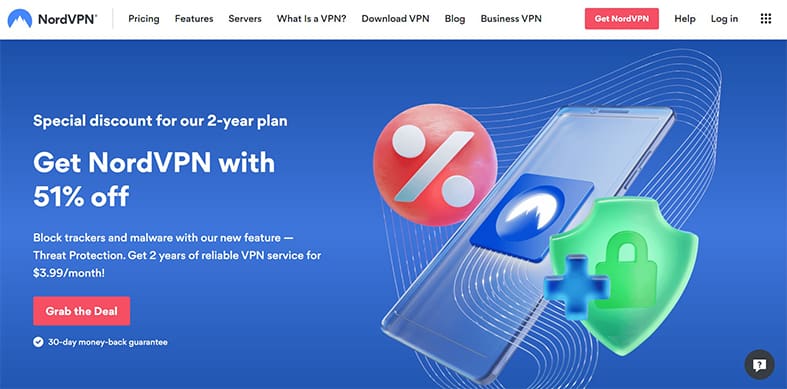
It is operated by Tefincom S.A, a company based in Panama. As a result, it falls under the jurisdiction of Panama, which does not have any laws that require data retention. This means that NordVPN can provide its service without keeping any logs. The VPN service offers an extensive network of servers in 59 countries and provides high-level security features, It also offers browser extensions for Chrome, Firefox, and Edge.
Security features include:
- Use of AES-256-GCM encryption algorithm
- Automatic kill switch
- DNS leak protection
- Regular software and security updates
- Strict no-logging policy
- CyberSec feature blocks malicious websites and online trackers.
Advantages
- 1 TB encrypted cloud storage
- Solid security features
- 5,566 servers in 60 countries
- No speed or bandwidth limits
Cons
- Slightly pricey rates
- A third-party breach in 2018
Pricing
| Standard | Plus | Complete | |
|---|---|---|---|
| Monthly | $11.99 | $12.99 | $14.29 |
| 1-year plan | $4.49/mo billed annually at $67.35 | $5.49/mo billed annually at $82.35 | $6.79 billed annually at $101.85 |
| 2-year plan | $3.69/mo billed at $99.63 | $4.69/mo billed at $126.63 | $5.99/mo billed at $161.73 |
2. CyberGhost VPN

CyberGhost is a VPN service that provides fast and affordable access to an extensive server network. It can be used for a variety of purposes such as accessing content that is blocked in a certain country, protecting personal information and online activity while using public Wi-Fi networks, or to bypass internet censorship.
Unique Features:
- Specialized servers for streaming platforms such as Netflix, Amazon Prime, Disney Plus, HBO Max, and Hulu
- Optimized servers for P2P file-sharing
- Good for torrenting due to its kill switch, no-logs policy, and DNS leak protection
- Split tunneling and ad and tracker blocking
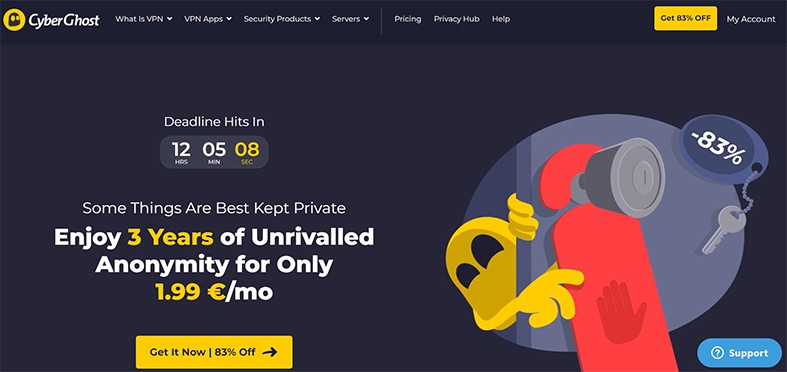
In terms of privacy and security, CyberGhost VPN claims to have a strict no-logs policy, which means that it does not collect or store any information about its users’ internet activity. Additionally, the company is based in Romania, which has strong data protection laws.
Security:
- Strict no-logging policy
- Uses WireGuard and OpenVPN protocols
- AES-256 encryption
- Based in Romania, which has strong data protection laws
- Network of over 9,000 servers in up to 91 countries, some of which are virtual
- Does not offer RAM-only servers or Double VPN
- Encryption method AES-256-bit encryption
- CyberGhost VPN also supports various protocols such as OpenVPN, IKEv2 and L2TP-IPSec
Cyberghost, based in Romania was founded by Robert Knapp in 2011, but it has been acquired by Kape Technologies since 2017. Kape Technologies, a UK-based holding company, has a diverse portfolio of companies in the cybersecurity industry.
Advantages
- Strong encryption used to protect user data
- Large server network with servers in 90 countries
- Strict no-logs policy
- User-friendly interface
- Wide range of supported devices and platforms
- Offers a free version
- Includes additional features like ad-blocking and anti-tracking
- 30-day money-back guarantee
Cons
- Some users have reported occasional connection issues
- Free version is limited in terms of speed and server selection
- Some extra features like the anti-tracking may not be available on all platforms
- Some Users report that their customer service is not good
- Some country locations might have a low number of servers.
Pricing
| Duration | Price |
|---|---|
| 1 month | $12.99 |
| 2 years (plus 4 months) | 2.03/mo Billed $56.94 first 2 years and yearly thereafter |
| 6 months | $6.99/mo Billed $41.94 every 6 months |
3. ExpressVPN

ExpressVPN is a virtual private network (VPN) service that allows users to securely and anonymously connect to the internet by routing their internet connection through a remote server.
Unique features include:
- A wide selection of server locations to choose from
- High-speed connections
- Network lock feature that ensures your internet connection is always secure
- Split tunneling feature that allows you to choose which apps and websites use the VPN connection
- 30-day money-back guarantee
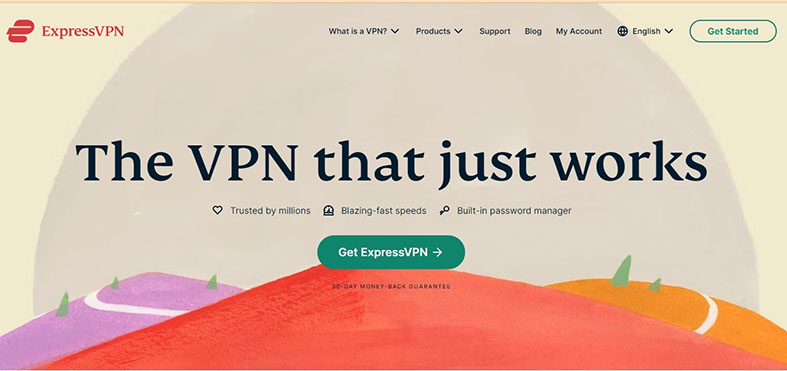
ExpressVPN prides itself on its privacy and security measures. Some of its key features include:
- No-log policy which means that the VPN does not keep any records of your online activity.
- Military-grade encryption to protect your data from hackers and government surveillance
- Automatic kill switch, which disconnects your internet connection if the VPN connection is lost, to protect your online identity.
ExpressVPN is based in the British Virgin Islands, which is outside the 5 Eyes, 9 Eyes, and 14 Eyes surveillance alliances. According to a news report on September 13, 2021, ExpressVPN, the virtual private network provider, was acquired by Kape Technologies. Kape Technologies is a publicly traded company on the London Stock Exchange, specializing in digital privacy and security solutions.
Advantages
- Unlimited potential connections
- Kill switch available
Cons
- Costlier than competing services
Pricing
| Duration | Price |
|---|---|
| 1 month | $12.95 |
| 6 months | $9.99/mo billed every month |
| 12 months | $8.32/mo billed annually |
4. IPVanish

IPVanish is a fast and affordable VPN service that allows unlimited device installations. It is primarily used to secure internet connections and protect users’ online privacy.
Unique features include:
- Split tunneling, split DNS, and split IPv6 support
- Compatible with Netflix, BBC iPlayer, and Hulu
- Permits torrenting on all servers
- Has a no-logging policy and no DNS leaks
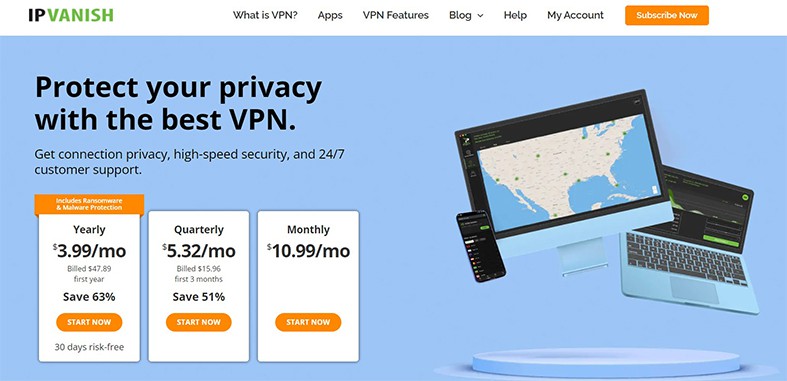
It has a small server network, and it doesn’t work well with all streaming services, including Amazon Prime Video and HBO Max. However, it includes AES-256 encryption, OpenVPN, and WireGuard protocols for security, as well as a kill switch.
Security features include:
- AES-256 encryption
- OpenVPN and WireGuard protocols
- Kill switch
- No-logging policy
- No DNS leaks
IPVanish is owned by J2 Global, Inc. (now called ZiffDavis Inc.) and is based in the United States, which means that there could be privacy problems. However, the VPN does not keep logs and ensure that users’ data are never shared with third parties. A recent audit by Leviathan Security Group further confirms this claim.
It’s important to note that IPVanish had a data breach in 2018, during which user data was handed over to the US government, which led to a questionable reputation. This VPN provider doesn’t include some advanced features like ad and tracker blocking, a dedicated IP, or a double VPN connection option.
Advantages
- Good Availability
- Forced 256-Bit Encryption
- No Logs Policy
- 8k Video Streaming Speed
Cons
- Unoptimized Servers
- Privacy Issues
Pricing
| Duration | Price |
|---|---|
| Monthly | $11.99 |
| Yearly | $3.99/mo billed at $47.89 the first year |
| Quarterly | $10.00/mo billed at $29.99 |
5. SurfShark

Surfshark is a VPN service that allows users to securely and privately access the internet by encrypting their online data and masking their IP address.
Features include:
- Allows unlimited device installations
- Stream popular platforms such as Netflix, Amazon Prime, Disney Plus, HBO Max, BBC iPlayer, and Hulu in select countries
- Support for P2P sharing on every server
- Optimized servers for faster download speeds
- Features like split tunneling, dedicated IP options, and ad tracker blocker
- Specialized servers for P2P file-sharing, static IP addresses, and double VPN connections
- Compatible with various devices, including Windows, Mac, Android, iOS, Linux, Android TV, Amazon Fire TV, and certain routers
- Browser extensions for Chrome, Firefox, and Edge
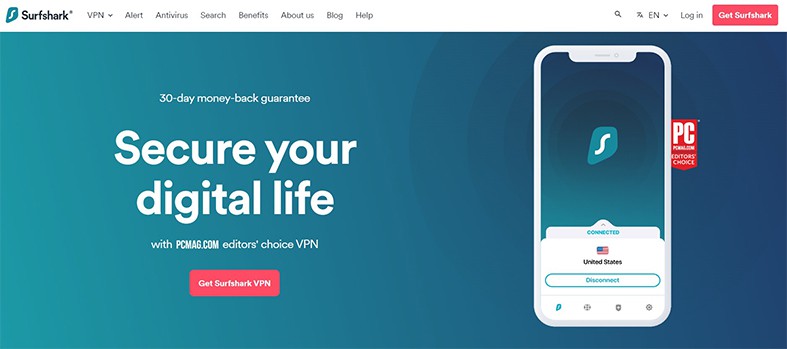
Security features include:
- AES-256 encryption
- WireGuard and OpenVPN protocols
- Kill switch
- Leak-blocking
- No-logging policy
Surfshark is based in the Netherlands. On February 2nd, 2022, a merger took place between Surfshark and Nord Security, after months of negotiation, however, both companies continue to function autonomously. This means that NordSecurity does not own Surfshark.
Advantages
- Strong security suite
- Above-average connection speeds
Cons
- Surfshark doesn’t have a free plan
Pricing
| Duration | Price |
|---|---|
| Monthly | $12.95 |
| 1-year plan | $3.95/mo billed at $47.68 the first year, then $59.76 every 12 months. |
| 2-year plan | $2.05/mo billed at $53.28 for the first 26 months, then $59.76 every 12 months. |
6. ProtonVPN

ProtonVPN is a virtual private network (VPN) provider that offers high-speed and robust security features. ProtonVPN may sound familiar to some people because it is owned by the same company as Protonmail.
Unique features include:
- AES-256 encryption
- DNS filter called Net Shield
- Secure Core servers to defend against network attacks
- P2P file-sharing protocols like BitTorrent
- 1,772 servers in 63 countries, with 96 Secure Core servers only available to ProtonVPN Plus users
- Free and paid options
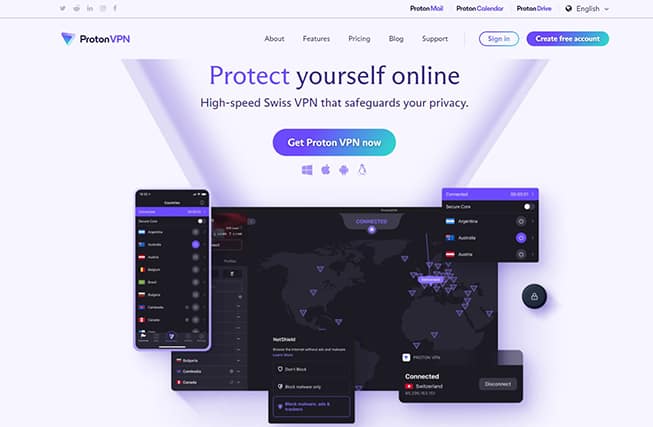
Security features include:
- AES-256 encryption
- Secure Core servers to defend against network attacks
- DNS filter called NetShield
ProtonVPN is based in Geneva, Switzerland and is operated by Proton AG, a Swiss employee-owned corporation. It has a strict no-logs policy under Swiss law, ensuring that no user data is collected or logged. Additionally, the company has a free option with medium speed and a paid option with 10 Gbps connection speed.
Advantages
- 10 Gbps max.
- A free plan is available.
Cons
- Medium speed for the free plan
- High 2-year plan rates
- Secure Core servers for paid users only
Pricing
| Duration | Price |
|---|---|
| Free | Free |
| Monthly | $10.58 |
| 1-year plan | $6.35/mo billed at $76.15 |
| 2-year plan | $5.29/mo billed at $126.88 |
7. Private Internet Access

Private Internet Access (PIA) VPN is a service that allows users to access any content around the world by bypassing restrictions imposed by governments and streaming services. It emphasizes privacy and security.
Unique features of PIA VPN include:
- Strong encryption and powerful protocols for flexibility and protection
- High-speed server network for fast browsing and streaming, with unlimited bandwidth
- 100% no-usage-logs policy
- Kill switch and ad blocking to protect user data
- Allows for connection up to ten devices
- 24/7 support
- accepts payment through gift cards and cryptocurrencies
- assigns users a new IP address
- split tunneling feature allows for unrestricted streaming and browsing
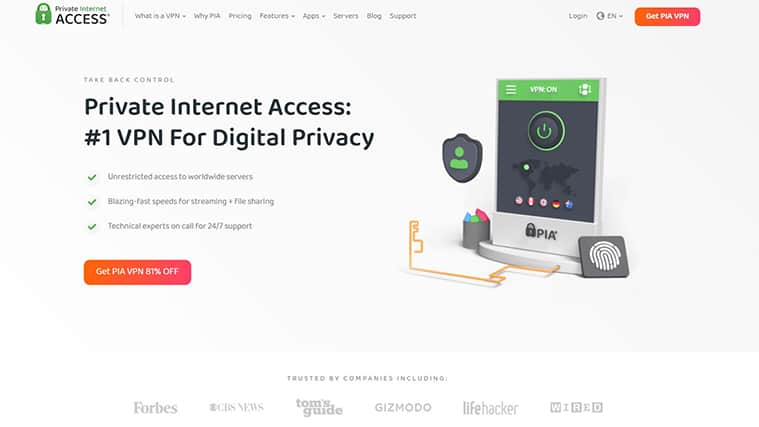
In terms of privacy and security, PIA VPN:
- operates a strict no-logs policy
- assigns users a new IP address
- accept anonymous payment methods such as gift cards and cryptocurrencies
- provides a Kill-switch feature that disconnects you from the internet if your VPN connection drops
- uses advanced encryption technologies to protect user data and privacy.
Private Internet Access (PIA) is now owned by Kape Technologies after being successfully acquired in November, 2019.
Advantages
- Runs a no-log policy
- No bandwidth caps on torrenting!
- The kill switch works reliably.
- Extremely customizable
Cons
- Average speed outcomes
- There is no third-party security audit.
Pricing
| Duration | Price |
|---|---|
| Monthly | $11.95/mo |
| 1-year plan | $3.95/mo billed at $39.95 annually |
| 3-year plan | $3.09/mo billed at $79 every three years |
Note:
Prices may differ from the ones shown as new plans and deals are launched on a regular basis. Please be sure to check the most current price on the official website.What to Look For When Choosing a Secure VPN?
Here are some features to look for when choosing a secure VPN.
Strong Encryption
Encryption is essential when evaluating a virtual private network (VPN) provider. A trustworthy provider will use multiple servers to transmit an individual’s internet traffic, which helps to maintain a high level of anonymity. While a standard VPN server is usually sufficient in most cases, a provider that offers various encryption modes is a sign of a top-notch service. Selecting a VPN provider that values an individual’s privacy and takes measures to protect it through reliable encryption mechanisms is vital.
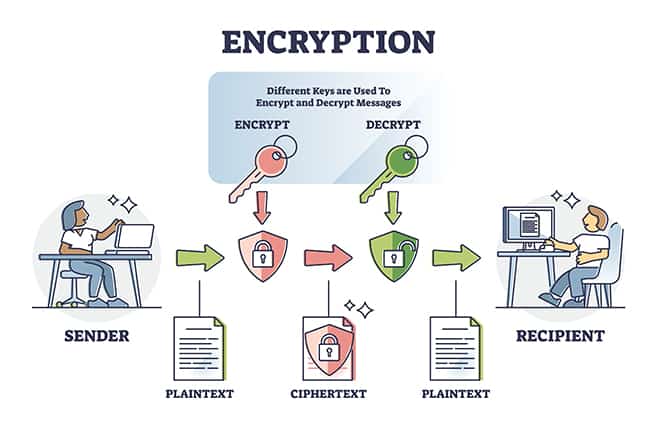
No-Logs Policy
When evaluating a virtual private network (VPN) provider, it is crucial to consider the logging policy. This policy determines what information the VPN provider will store about an individual’s internet activities. It is advisable to choose a no-logs VPN which means they do not save information about the sites visited or files downloaded. To verify a potential provider’s logging policy, one should look for a section in the privacy policy that outlines the type of information they collect. A reputable VPN provider will only collect basic information such as an email address or username, payment information, and optional diagnostic information if the software crashes. These providers often market themselves as “no-log VPNs” and prioritize protecting privacy.
Kill Switch
A Kill Switch is a useful feature for maintaining online privacy, especially when a Wi-Fi connection is lost and reconnected. It works like a security button by automatically turning off the internet if the VPN is not functioning properly. If continuity of service is a concern when searching for a VPN, then a Kill Switch is a desirable feature to look for.
Leak Protection
A VPN establishes a secure, encrypted connection between a device and the internet, which can safeguard data from being intercepted by third parties. However, if there are any “leaks” in the VPN connection, an individual’s data may still be at risk. By choosing a VPN with leak protection that also carries out regular VPN leak tests, individuals can ensure that their data is always protected, even if the VPN connection is temporarily disrupted. This is especially important if the VPN is being used to protect sensitive information, such as financial data or personal identification documents.
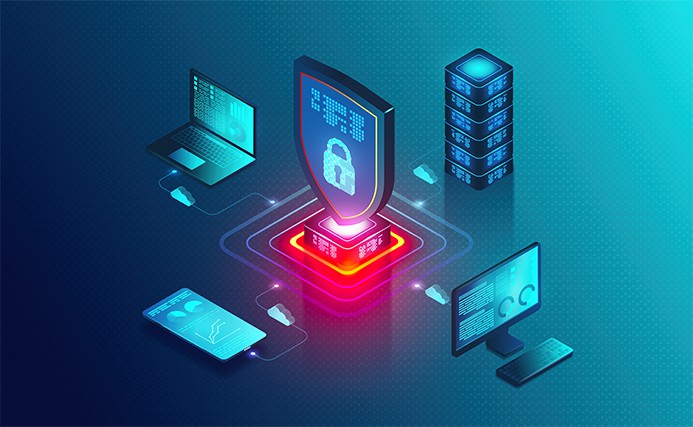
No Past Data Breach
It is beneficial to select a virtual private network (VPN) provider that has not previously experienced any data breaches because a data breach can compromise the security of personal information. During a data breach, hackers may gain access to sensitive data such as passwords, financial information, and personal identification information. This can result in identity theft, financial fraud, and other types of cybercrime. By choosing a VPN provider that has not experienced any previous data breaches, individuals can be assured that their personal information is being protected and kept secure. If the VPN has had a data breach but changed ownership then the risk is minimized since the new company should have different SOP’s and security standards.
Which VPN Protocol is the Most Secure?
VPN protocols are rules that dictate how data is packaged and transmitted over a private network. They create VPN tunnels to securely exchange data, which is similar to sending a package through the mail in real life.
Several VPN types include WireGuard, L2TP/IPsec, OpenVPN, SSTP, PPTP, and IKEv2. While each has its strengths, many cybersecurity experts consider OpenVPN the most secure VPN protocol. It is compatible with various encryption ciphers, including AES-256, Blowfish, and ChaCha20, and has no known vulnerabilities. It is also widely supported by VPN services.
Are VPNs 100% Secure?
A VPN is not 100% secure. While it can add an extra layer of security to a person’s internet connection, there are better solutions than this one. Several factors can affect the security of a VPN, such as the strength of the encryption used, the protocols supported, and the server locations available.
Note:
Additionally, it’s important to note that VPNs do not protect against all types of cyber threats, such as malware downloaded onto a person’s device.It’s also important for a person to choose a reputable and trustworthy VPN provider, as some VPNs may not be as secure as they claim to be more secure. It’s always a good idea for a person to do their research and read reviews before choosing a VPN.
Why do you Need a Secure VPN?
There are several reasons a person may want to use a Virtual Private Network (VPN) to secure their internet connection. When people connect to the internet, their online activities can be tracked and logged by their internet service provider (ISP) or other third parties. A VPN encrypts their internet connection, making it more difficult for anyone to track or monitor their online activities. A VPN can help protect a person’s device from cyber threats like hackers and malicious software. When they connect to a VPN, their data is encrypted, making it more difficult for anyone to intercept or access it. Some websites and content may be restricted in certain countries or regions. VPNs help people bypass these restrictions by routing their internet connection through a server in a different location. They also help protect a person’s identity by masking their IP address, a unique identifier that can be used to track their online activities.
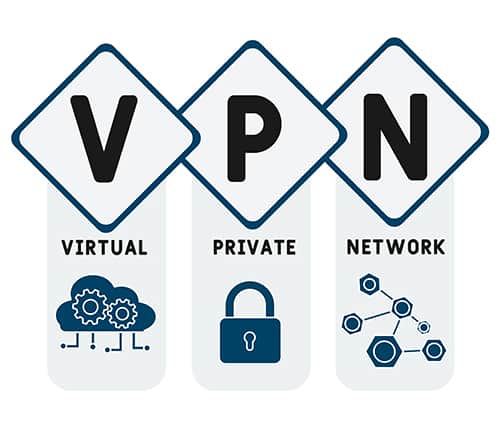
Are Free VPNs Secure?
Free VPNs are not as secure as paid ones. Free VPNs may have less encryption or protocols, which could undermine your security. Some free VPNs sell user data, compromising privacy. They may also have slower speeds and fewer server locations, making it harder to evade regional limitations. Additionally, free VPNs may not offer the same security and privacy as paid VPNs.

